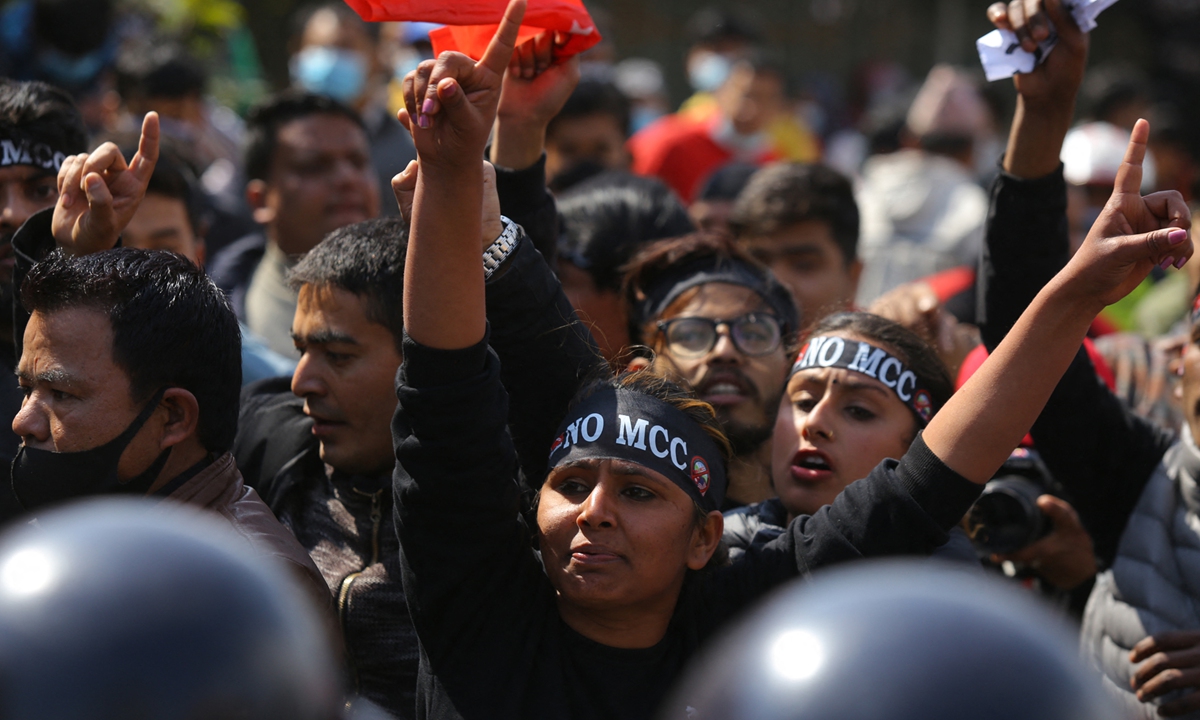
Nepalese protest against the MCC in Kathmandu, Nepal on February 20, 2022. Photo: AFP
The Millennium Challenge Corporation (MCC), a US-offered infrastructure aid deal, recently has brought chaos to Nepal's politics and society. The US urged Nepal to endorse the MCC by February 28, but facing massive anti-MCC protests and a lack of consensus among political parties, Nepal's House of Representatives on Friday has decided to postpone the discussion on the matter till Sunday.
While the program's destiny is still undecided in Nepal, Sri Lanka, also one of MCC's targets in South Asia, has already rejected the offer. Sri Lankan President Gotabaya Rajapaksa had said in 2020 that "the MCC agreement will not be signed even in dream."
It seems that the MCC is facing huge obstacles in South Asia. The doubts from Nepal and rejection by Sri Lanka reveal three plain facts:
First, it proves that Washington's model of attaching political conditions to economic aid is gradually failing.
Under the guise of economic assistance programs, the US has adopted a series of provisions that directly place US laws and interests above the laws of the targeted countries. This way, it attempts to obtain huge strategic gains with low economic inputs. Essentially, programs like the MCC are modern colonialist tools employed by the US to conduct invisible control and long-arm jurisdiction in developing countries.
How the MCC works in countries like Madagascar, Mali, Tanzania and the Philippines proves that the US can suspend or terminate aid at any time using excuses such as the country is "not democratic" or that Washington's interests are being undermined. This has made Nepal and Sri Lanka realize that the MCC may bring short-term benefits, but will definitely cause great harm to their national security and development in the long run.
Second, it shows that South Asian countries have increased their consciousness of their national identity and sovereignty. They have also increased their confidence in developing independently.
After the end of the Cold War, the US claimed the Washington Consensus, with neoliberalism as its core concept, to be a universal development model. However, countries that have followed this model faced problems, including slowed economic growth and increased disparity between the rich and the poor. They have, in fact, fallen into the trap of modernization offered by the West so that they can have a dependence on it.
Countries, such as Nepal and Sri Lanka, don't want to make the same mistake. And in recent years, the construction of the Belt and Road initiative (BRI) in South Asia has offered Nepal and Sri Lanka a model of modernization different from the West's. These nations have also directly benefited from China's model. More importantly, China's path to modernization has profoundly met their demands for fast socio-economic development while maintaining their national identity. Therefore, the neoliberal model represented by the MCC has already lost its appeal.
Third, it demonstrates that regional countries are unwilling to take sides in the game of major powers.
These nations know perfectly that the MCC may look like just an economic aid program, it actually serves Washington's Indo-Pacific Strategy that mainly intends to hinder development of the BRI and contain China's growing influence in the region. Once Nepal and Sri Lanka accept the MCC - an important part of the Indo-Pacific Strategy, they will inevitably be forced to join the "third circle" consisting of Southeast Asian, South Asian and Pacific Island countries to contain China. This is in the interest of the US and India, but not Nepal and Sri Lanka.
Nepal, for example, has the strategic desire to benefit from China's economic development and reduce its overall dependence on India. On the other hand, it has been dedicated to becoming an Asia's land-based free trade port, and a bridge between China and India. In this way, it can completely upgrade its position in the geopolitical and economic pattern of South Asia.
Therefore, countries such as Nepal and Sri Lanka hope to adhere to an "equidistance" diplomacy. They want to benefit from the competition between major powers, rather than becoming a "bridgehead" in the game. And because of the consideration of such strategic interests, Washington's MCC is doomed to lose its market in South Asia.
The authors are research fellows of the Institute for International Strategic Studies, Chengdu Academy of Governance. opinion@globaltimes.com.cn




